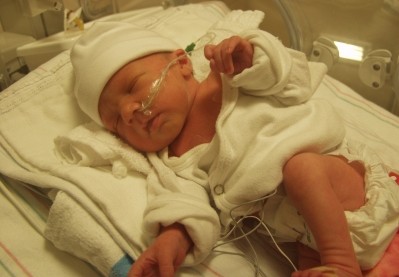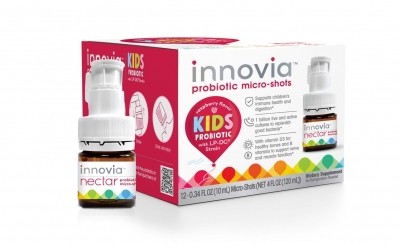Probiotics help preterm babies establish a 'normal' microbiome: Study

UK-based researchers from the Quadram Institute, the University of East Anglia and the Norfolk and Norwich University Hospital (NNUH) analyzed data from two cohorts of preterm infants: The first group involved 101 babies that were orally supplemented with a combination of Bifidobacterium and Lactobacillus bacteria in the neonatal intensive care units (NICUs). The second group included 133 infants from NICUs not using probiotic supplementation.
While both groups received breast milk, the report in Cell Reports Medicine points out that the breast milk was not enough to encourage high levels of Bifidobacterium (as is seen in full-term infants) without probiotic supplementation.
"This is one of the largest studies with preterm infants to date, and we were excited to find that matching the right probiotic Bifidobacterium—a strain that can digest breast milk—allowed it to persist in the gut and as a result significantly reduce potentially nasty bacteria that have been associated with serious infections,” said Dr Lindsay Hall from the Quadram Institute, who helped launch the study.
“We hope that our findings will help direct future clinical trials and practice and help clinicians and healthcare professionals make a rational choice when it comes to diet-microbe combinations, and ultimately help these at-risk preterm babies."
The issue
Worldwide, one in nine babies are born preterm, or before 37 weeks gestation. When compared to those born full-term, preterm babies are more often born by c-section, have an underdeveloped immune system, receive numerous courses of antibiotics, and land in NICUs - all of which are detrimental to early-life gut microbiota development.
This disruption of the gut microbial ecosystem has been linked to an increased risk of life-threatening infections and health problems later in life such as asthma.
Past studies have found that routine probiotic supplementation is beneficial, even cutting rates of necrotising enterocolitis (NEC) and sepsis in half.
While some hospitals do routinely supplement preterm babies with probiotics, most do not.
Findings from the BAMBI Study revealed that specific strains of probiotic Bifidobacterium and Lactobacillus bacteria given to preterm babies in combination with breast milk helps build microbial populations and gut health that mirror those of full-term babies.
The study
Researchers carried out an observational study that compared longitudinal samples from two cohorts of preterm infants. Over their first 100 days of life, the researchers collected and analyzed fecal samples from each of the babies, 592 samples in all.
“Although previous studies have investigated aspects of this before, this is the largest observational study to combine multiple factors: fecal microbiota composition analysis, metabolomics, fecal pH, whole-genome sequencing of supplemented probiotic strains, and fecal isolates to determine probiotic persistence, complemented by phenotypic testing. A key strength relates to the size and scope of the study, representing one of the largest reported longitudinal studies in preterm infants,” the authors noted.
Findings
The research indicated notable differences in the microbiota profiles between the two groups.
The supplemented infants had microbiota dominated by Bifidobacteria. Breast milk contains human milk oligosaccharides (HMOs) that babies can't digest by themselves, rather serving as food for bacteria (HMOs are prebiotic).
On the other hand, the guts of the unsupplemented babies contained a range of bacteria, including unhealthy Staphylococcus, Escherichia, and Klebsiella. The researchers note this varied profile is more typical of a preterm baby's gut.
“This study demonstrates that microbiota supplementation is associated with a Bifidobacterium-dominated preterm microbiota and gastrointestinal environment more closely resembling that of full-term infants,” the authors concluded.
Additionally, fecal analysis found lower levels of HMOs excreted by the supplemented babies, but higher levels of their breakdown products, acetate and lactate. These compounds are reported to boost the defense provided by cells lining the gut and associated with the immune system.. These compounds may be why there was a pH drop in the fecal samples from the supplemented babies, which further boosts health by making the environment too acidic for some of the disease-causing bacteria to thrive.
"Alongside the key microbiological findings of this study, we have also provided context for further trials focusing on clinical practice in NICU and suggestions for future intervention studies in this at-risk infant population," wrote the researchers." Providing maternal and donor [breast milk] may be required for successful persistence of Bifidobacterium, which may also contribute to the enhanced metabolic end-products such as acetate and lactate in the preterm gut.
"This large-scale longitudinal observational multi-center-controlled study emphasizes the important role that targeted microbiota or probiotic supplementation plays in preterm infants, exerting beneficial modifications on preterm gut microbial communities, and metabolic end products."
The study was funded by the Wellcome Trust and the Biotechnology and Biological Sciences Research Council, part of UKRI.
Source: Cell Reports Medicine
2020, doi: 10.1016/j.xcrm.2020.100077
"Microbiota Supplementation with Bifidobacterium and Lactobacillus Modifies the Preterm Infant Gut Microbiota and Metabolome: An Observational Study"
Authors: C. Alcon-Giner et al.
















